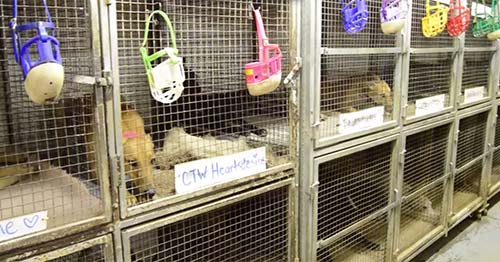 |
| Caged greyhounds at the Sanford Orlando Kennel Club in Florida |
Recently state Senator Tom Lee proposed a Constitutional amendment that would end greyhound racing in the state of Florida. While the proposed amendment still has several legal steps to go before it reaches the ballot, some early polling suggests it would be approved by more than the required 60% of voters.
Predictably, the greyhound racing industry has reached into its
tired rhetorical grab bag in an attempt to muddy the waters on what is a straight
forward effort to end the unnecessary suffering, injury and needless deaths of
innocent greyhounds. Their basic strategy has always involved the following:
change the subject and/or, predict economic catastrophe while at the same time
engaging in personal attacks.
The proposal is still in the initial stages of development and
we have already seen racing proponents question the motivations of those supporting
it as well as attempt to move the discussion away from greyhound welfare to
topics like no kill shelters. It would seem if anyone’s motivation needed to be
questioned it would be those who stand to make a profit from the continued
exploitation of helpless greyhounds trapped in racing gulags across the state. With
depressing regularity we read stories of greyhounds being drugged, abused and
abandoned. Who could honestly argue for the continuation of this situation?
What are their motivations? Another tactic the industry employs is to point the
finger at other aspects of animal cruelty, for example the number of strays put
down in shelters. Certainly no kill shelters are a good idea and should be
pursued, but that is a separate conversation — especially since greyhounds seldom
end up in shelters — which has nothing to do with
ending racing. What are the motivations of those who
would attempt to sideline the discussion of Senator Lee’s amendment for a
different topic altogether?
Every time the racing supporters perceive a threat they
clamor that there will be massive unemployment and commercial devastation
because of the indirect impact the industry has on local economies. The truth
is most jobs are part time, low wage and offer few if any benefits. The real
money is made by those at the top. For example, in West Virginia a study found that nearly half of the $15 million the
state pays out in subsidies goes to 10 individuals. Certainly if greyhound
racing ends in Florida some will lose their jobs, but the same thing happened
in Iowa when the state withdrew its support, yet made sure that those who were
adversely affected received a soft landing to help them transition. There is no
reason to think the same wouldn’t happen in Florida. And while the industry
does have an indirect effect on the economies around it, that effect is
mitigated by the fact that it has to be propped up with subsidies from states
and local casinos. In 2013,
Florida spent as much as $3.3 million more regulating the so called sport than
it took in through taxes.
We predict that as this amendment moves through the process
Senator Lee and those who stand with him will come under increasing personal
attacks. Actually, it’s already started. I commented on an article about the
amendment and I’ve been called a con man and a white collar criminal, accused
of working for a ponzi scheme and challenged to meet “face to face” for what I
imagine would not be a rational discussion of the issue. Verbal intimidation
and name calling are common industry responses and are another attempt to
change the subject.
Florida political observer Joe
Henderson gives the proposal no more than a 2 in 5 chance of success, but
regardless of the odds it’s a sure bet the industry will pull out all the stops
in its campaign of distraction, dissembling and character assassination. We
cannot let this happen. Those who favor
greyhound racing should be forced to account for the institutionalized cruelty,
the callous disregard of health and welfare and the unnecessary pain and
suffering endured by the helpless dogs in their so called care. The central
question is this: Does a business that relies on the heartless exploitation of
innocent living creatures for profit, and then abandons those creatures when
they are no longer profitable have a place in Florida society today?
